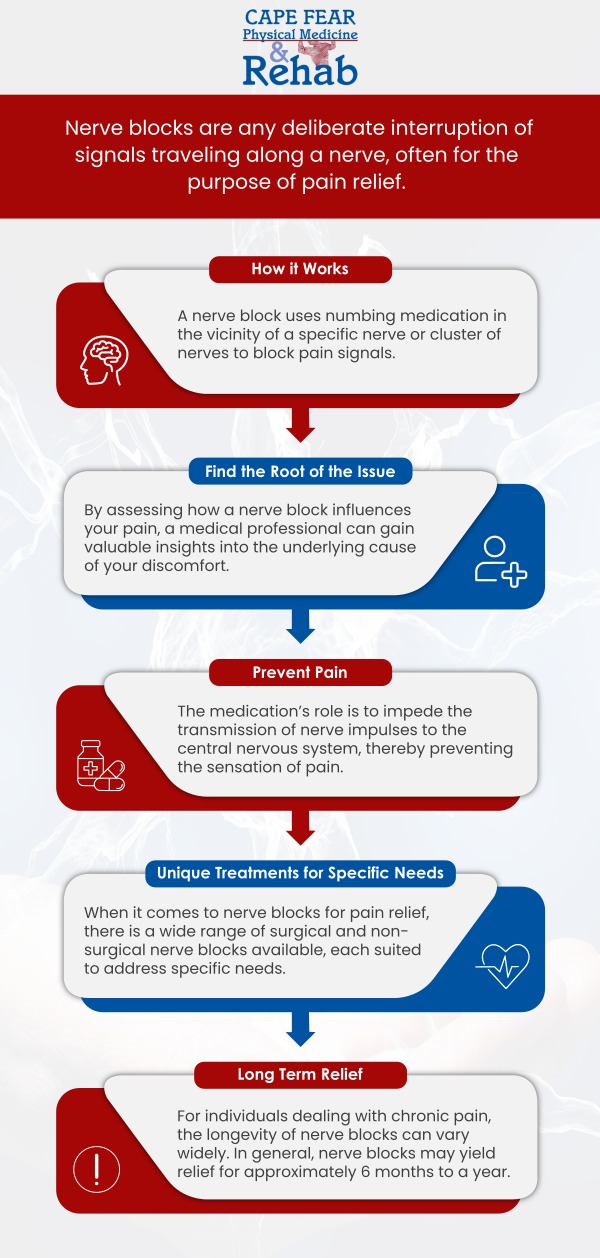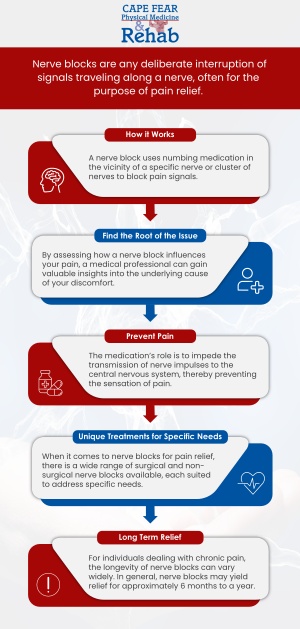Genicular Nerve Blocks Treatment Specialist Q&A
Genicular nerve blocks are a treatment option for patients suffering from knee pain, particularly due to conditions like osteoarthritis or injury. This procedure involves the injection of a local anesthetic or steroid near the genicular nerves, which are responsible for transmitting pain signals from the knee joint. At Cape Fear Physical Medicine and Rehab, our professional team specializes in genicular nerve blocks, providing targeted relief to reduce inflammation, alleviate pain, and improve mobility. This minimally invasive treatment can be a valuable part of your pain management plan, helping you regain function and comfort. For more information, contact us or schedule an appointment online. We are conveniently located at 1540 Purdue Dr, Ste. 200, in Fayetteville, NC 28303.




Table of Contents:
What is a Genicular nerve block?
What is the difference between a nerve block and ablation?
How is a Genicular nerve block done?
How long does a Genicular nerve block last?
Our knees provide an unmatched level of support and mobility, enabling our legs to motion so we can walk, run, and swim. The genicular nerves run through the knees and can cause pain if irritated or inflamed. Thanks to advances in modern medicine, there are nerve block treatments that can reduce the amount of pain in the knee to improve the quality of life.
A genicular nerve block is a type of anesthetic injection that is used to numb a certain area of the body. It can be used for various purposes, including for the purposes of diagnostic testing, managing pain, and surgical procedures. It is one of the most commonly used forms of anesthesia and can be administered by a wide range of medical professionals. It is a type of epidural block and can be administered either in the outpatient or inpatient setting. It is commonly used alongside other forms of pain management such as pain relievers or other types of injectable medications.
While both treatments have the same end goal to relieve chronic pain, there are several key differences between them:
• Ablation stops pain signals by burning the nerve endings but does not address the joint inflammation, whereas a nerve block reduces nerve inflammation and also does not obliterate the disturbed nerve.
• On average, ablation lasts for a year, while nerve blocks last for a few months and can be safely repeated.
• Ablation can be used in many places on the body as long as there is a sensory nerve affected and nerve blocks are used to prevent pain signals from reaching the central nervous system, thereby resulting in a reduction of pain.
On the day of the genicular nerve block, patients must be in good health with no symptoms of illness, and not taking any antibiotics. Most doctors will advise their patients to not eat anything the night before and the morning of the procedure, and may also suggest limiting water to a few sips. If the patient or physician decides sedation should be used during the procedure, the doctor will want to administer that while the patient has an empty stomach.
Once the patient is all-clear to proceed, they will be asked to lie down, possibly with a pillow under their knee. If the patient chooses to have sedation, they will have an IV placed to deliver the medicine and may be attached to monitors. After this, the doctor will carefully clean and disinfect the area of injection, then administer a numbing agent (local anesthetic) to the area.
The doctor will identify the genicular nerves to be targeted using fluoroscopy or ultrasound. With a slightly larger needle, the administering physician will inject a steroid and local anesthetics (often combined into one injection). As the medications touch the nerves, many people experience immediate pain relief. The whole procedure takes between 15 and 30 minutes but may take longer if the patient chooses to receive sedation.
The effects of a genicular nerve block have different durations for different people. However, on average, patients benefit from the results anywhere from eight to 24 hours. In some cases, patients who experience pain relief with genicular nerve blocks will also get radiofrequency ablation because the effects of a genicular nerve block are fairly short-lived. When combined, these two procedures can offer pain relief that lasts from six months to a year, although individual results will vary.
For quality healthcare, you can trust, come to Cape Fear Physical Medicine and Rehab. Our medical professionals are experienced providers of genicular nerve blocks and can help you find relief from your pain. Contact us today to book an appointment to learn more about this minimally invasive procedure and how it can support your recovery and overall well-being. We are conveniently located at 1540 Purdue Dr, Ste. 200, Fayetteville, NC 28303. We serve patients from Fayetteville NC, Woodfield NC, Hope Mills NC, Fort Bragg NC, Eastover NC, and surrounding areas.

Additional Services You May Like
▸ Weight Loss & Wellness Program
▸ Botox for Migraine
▸ EMG Nerve Conduction Studies
▸ Epidural Steroid Injections
▸ Radiofrequency Ablation
▸ Rehabilitation Consultations
▸ Facet Injections
▸ Sacroiliac Joint Injections
▸ Joint Injections
▸ Genicular Nerve Blocks
▸ Prosthetic Evaluation/Management
▸ Adjuvant Therapy/Care
▸ Spasticity Management
▸ Stroke Treatment
▸ Multiple Sclerosis
▸ Spinal Cord Injury
▸ Traumatic Brain Injury
▸ Lifestyle Medicine
▸ Phentermine
▸ Qsymia
▸ Contrave

Additional Services You May Like
▸ Weight Loss & Wellness Program
▸ Botox for Migraine
▸ EMG Nerve Conduction Studies
▸ Epidural Steroid Injections
▸ Radiofrequency Ablation
▸ Rehabilitation Consultations
▸ Facet Injections
▸ Sacroiliac Joint Injections
▸ Joint Injections
▸ Genicular Nerve Blocks
▸ Prosthetic Evaluation/Management
▸ Adjuvant Therapy/Care
▸ Spasticity Management
▸ Stroke Treatment
▸ Multiple Sclerosis
▸ Spinal Cord Injury
▸ Traumatic Brain Injury
▸ Lifestyle Medicine
▸ Phentermine
▸ Qsymia
▸ Contrave







